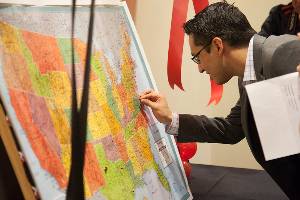March Madness – With a Stethoscope
Medical sudents met their match
 Just as basketball fans wait every year for the tradition, excitement and upsets of
March Madness, medical students awaited the same with Match Day. Fourth-year medical
students from the Texas Tech University Health Sciences Center (TTUHSC) School of
Medicine participated in Match Day.
Just as basketball fans wait every year for the tradition, excitement and upsets of
March Madness, medical students awaited the same with Match Day. Fourth-year medical
students from the Texas Tech University Health Sciences Center (TTUHSC) School of
Medicine participated in Match Day.
Match Day is a nerve-racking event that has played out on medical school campuses across the country since 1952. Approximately 149 TTUHSC School of Medicine students participated in Match Day and learned where they will be for the next three to seven years for their residencies. Across the country, medical students opened their results that were sealed in an envelope and opened simultaneously at all of the nation’s medical schools.
“The Class of 2015 has a record of excellence in course work, patient care and community service,” said Steven L. Berk, M.D., TTUHSC executive vice president and provost and dean of the School of Medicine. “We are proud of our students’ accomplishments this past Match Day and enjoyed sharing their excitement as they pursue their careers at outstanding teaching programs around the country.”
This year the TTUHSC School of Medicine students matched to institutions including Wake Forest Baptist Medical Center, Vanderbilt University Medical Center, UCLA, Brown University, Walter Reed National Military Medical Center, University of Texas Southwestern Medical School, Duke University, and University of Virginia.
Twenty-four of the 149 students matched at TTUHSC with another 48 percent staying in Texas. TTUHSC students matched in 31 states in 27 specialties. With such a need for primary care physicians, Berk is particularly proud that a high percentage of students from this class are focusing on primary care.
“Because our School of Medicine has led nationally to push educating primary care physicians, we were pleased to see the number of students focusing on these fields,” Berk said. “Over half of our students who matched went into primary care.”
Nationally, the average percentage of students going into family medicine was about 9 percent. TTUHSC School of Medicine will graduate nearly 20 percent of its students with specialties in family medicine.
“All of our students who matched received an excellent education, and we are excited to see the wonderful things they will do in the medical profession, both here and across the country,” Berk said.
Related Stories
Celebrating Veterans: TTUHSC’s General Martin Clay’s Legacy of Service and Leadership
From his initial enlistment in the Army National Guard 36 years ago to his leadership in military and civilian health care management roles, Major General Martin Clay’s career has been shaped by adaptability, mission focus and service to others.
Texas Tech University Health Sciences Center School of Nursing Named Best Accelerated Bachelor of Science in Nursing Program in Texas
The TTUHSC School of Nursing Accelerated Bachelor of Science in Nursing (BSN) program has been ranked the No. 1 accelerated nursing program in Texas by RegisteredNursing.org.
TTUHSC Names New Regional Dean for the School of Nursing
Louise Rice, DNP, RN, has been named regional dean of the TTUHSC School of Nursing on the Amarillo campus.
Recent Stories
The John Wayne Cancer Foundation Surgical Oncology Fellowship Program at Texas Tech University Health Sciences Center Announced
TTUHSC is collaborating with the John Wayne Cancer Foundation and has established the Big Cure Endowment, which supports the university’s efforts to reduce cancer incidence and increase survivability of people in rural and underserved areas.
TTUHSC Receives $1 Million Gift from Amarillo National Bank to Expand and Enhance Pediatric Care in the Panhandle
TTUHSC School of Medicine leaders accepted a $1 million philanthropic gift from Amarillo National Bank on Tuesday (Feb. 10), marking a transformational investment in pediatric care for the Texas Panhandle.
Texas Tech University Health Sciences Center Permian Basin Announces Pediatric Residency Program Gift
TTUHSC Permian Basin, along with the Permian Strategic Partnership and the Scharbauer Foundation, Feb. 5 announced a gift that will fund a new pediatric residency.
